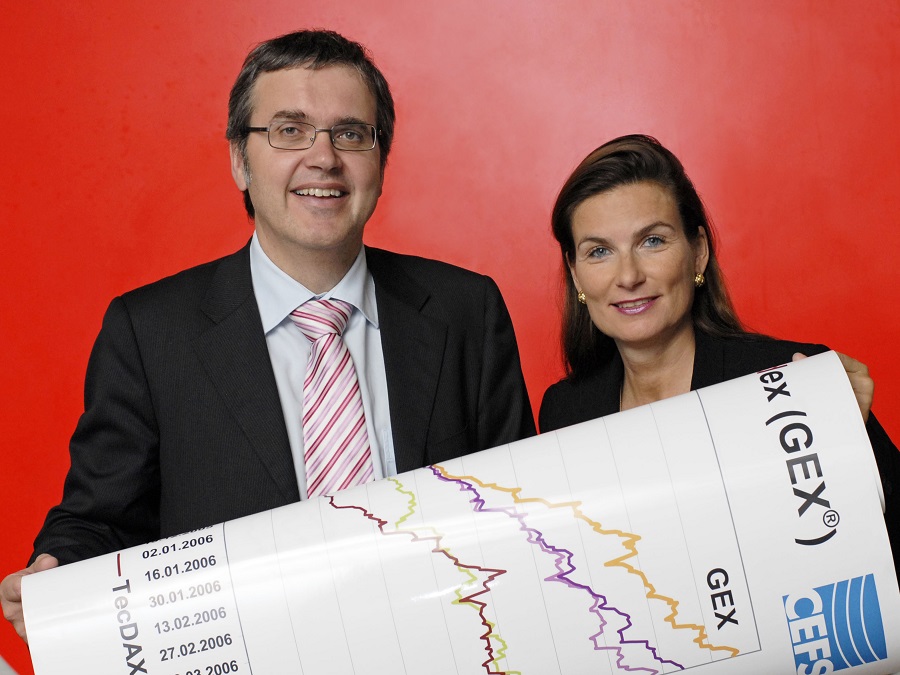TUM researchers guide stock index development, will define composition
German stock exchange to create two new "family firm" indices

Researchers here have shown that this group of companies, listed on the German stock exchange but strongly influenced by founding families, represents a large and distinctive segment of the economy. Some 130 such firms occupy a dynamic middle ground between widely held public companies and privately held businesses.
"As far as we know, these are the first official family firm indices worldwide," says Prof. Christoph Kaserer. Beyond developing the indices in cooperation with Deutsche Börse, the research institute co-directed by Prof. Christoph Kaserer and Prof. Ann-Kristin Achleitner will play an ongoing role in their operation. "The continuous tracking of each index will be done by our institute, CEFS. So we will define the composition of those indices quarter by quarter, and then Deutsche Börse will do the calculation of the index values not only day by day but minute by minute."
The researchers have discovered that this group of family firms has performed differently over the past eight years – in some respects better – than the broader DAX. Their studies also reveal some distinctive patterns in management and operations. For example: Family firms appear to be governed with long-term sustainability in mind; though they tend to be smaller, they create new jobs at a faster rate; and though downturns such as the current worldwide recession may hit them harder than more diversified companies, they may be positioned to recover more quickly when conditions improve.
A so-called "founding family definition" is the most important criterion distinguishing the new indices from the German Entrepreneurial Index or GEX, which also was developed cooperatively by Deutsche Börse and CEFS. In the 130 or so businesses represented by the new indices, the founding family can exercise its influence through ownership and/or management – specifically, by holding at least 25% of the company's voting rights or by holding at least 5% of the voting rights and having a family member on either the management board or the supervisory board.
In family firms, Kaserer says, so-called "agency problems" that contributed to the current economic crisis either do not exist or are mitigated. "By agency problems we mean the fact that the management of the company is not always acting in the interest of the owners of the company. But the family has an interest in seeing that the company is run in the best interest of all the shareholders."
Around 30% of "prime standard" listed firms belong to this diverse group – including pharmaceutical, chemical, technology, and construction companies as well as manufacturers such as Volkswagen and software providers such as SAP – and they represent around 20% of German market capitalization. The family firm indices will for the first time give investors, economists, government officials, and the public a way to track the performance of this important part of the economy. "Investors might also be interested in participating in this performance," Kaserer says, "by buying these companies, or by buying certificates or other products that are related to their performance."
On another level, Achleitner says, "This crisis has made us rethink our ideas about the economy and has highlighted the importance of a long-term perspective. It would make sense, if we look at the reasons for this crisis, to consider investing more specifically in long-term-oriented companies. It would be interesting to see if investors put their money where their mouth is."
According to Kaserer, similar family firm indices could be economically informative and financially important in Italy, Switzerland, France, and other continental European countries, or on a larger scale. "I'm pretty sure," he says, "that the idea will come up for index providers to create a European-wide family firm index." He adds that family firms are also important in Asian economies and even, to a lesser degree, in the United States – but that for some exchanges, such as the New York Stock Exchange, providing such indices simply is not part of the business model.
In the next phase of research, funded in part by the German Research Foundation (DFG), the Center for Entrepreneurial and Financial Studies will investigate issues including innovation management, communication, and executive compensation in family firms. The center has also begun building a database to study family firms that are not listed on the stock exchange but could be.
More information:
Center for Entrepreneurial and Financial Studies home page: www.cefs.de
Film about the two new "family firm" indices: www.tum.de/film/index_html